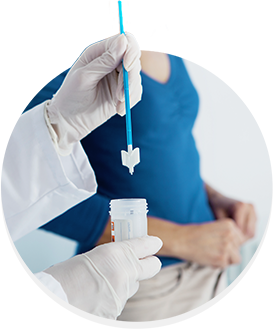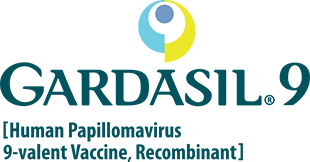Home > Protection against HPV
According to The Society of Obstetricians and Gynaecologists of Canada, the only way to totally protect against HPV is to completely abstain from any sexual activity that involves genital contact – a fairly unrealistic option.
Short of total protection, there is a benefit to protecting yourself to the best of your ability, regardless of whether you are currently sexually active, or whether or not you have already been infected with HPV.
Listed below are certain steps you can take to help protect yourself and help decrease your risk of contracting or transmitting HPV.
-
For women
-
For men
-
For parents
For women
It’s a fact…Regular Pap tests and HPV vaccination may help prevent cases of cervical cancer
Consider being vaccinated with GARDASIL®9
HPV vaccination is NOT just for kids. You can get the virus at any point in your life while sexually active. GARDASIL®9 can be administered in individuals 9–45 years of age. Vaccination with GARDASIL®9 can provide effective protection against the 9 HPV types that cause about 90% of cervical cancer cases, at least 25% of vulvar cases, 74% of vaginal cancers, 80–90% of anal cancers and precancers, 70% of certain head and neck cancers, such as throat and back of mouth cancers, and the 2 HPV types that cause over 90% of genital warts.
If you’re already infected with the virus, it’s NOT too late to be vaccinated. Even if you may have been infected with one type of HPV, vaccination can still help protect you from other types of the virus contained in the vaccine. The vaccine cannot treat an existing HPV infection, however.
Many low-risk HPV types will clear up on their own, but some can cause genital warts. There are also high-risk types that can cause cancers like cervical, vaginal, vulvar, anal and certain head and neck cancers, such as throat and back of mouth cancers. So, helping to protect yourself with the GARDASIL®9 vaccine just makes sense.
If you choose to help protect yourself with the GARDASIL®9 vaccine, you may also want to share your knowledge on HPV prevention with someone you care about.
Talk to your healthcare professional today to find out if GARDASIL®9 is right for you.
Use a condom
Just remember that using a condom is not a guarantee for complete protection against HPV, because it only protects the area it covers. HPV can still be contracted through skin-to-skin contact beyond the area the condom is covering. That said, using a condom is a great way to reduce your risk of HPV infection, not to mention an excellent way to protect against other sexually transmitted infections.
Have regular Pap tests
Just like a mammogram screens for breast cancer, your Pap test helps screen for cervical cancer. A Pap test is a simple screening method that detects cell changes in the cervix. Regular Pap tests are the best way to find abnormal cervical cells early and treat them before they develop into cervical cancer. The majority of abnormal Pap tests are caused by HPV. To get a Pap test, make an appointment with your healthcare professional.
Remember: Pap tests should be performed routinely, even after vaccination.
Put the cigarette out – for good
Smoking lowers the immune system and makes it less effective in fighting against HPV infections. It is also a factor in the development of various cancers, as well as genital warts. Women who smoke are about twice as likely as non-smokers to get cervical cancer – good enough reason to quit, no?
For men
Genital warts and cancer – need we say more?
Consider getting vaccinated with GARDASIL®9
HPV vaccination is NOT just for women. You can get the virus at any point in your life while sexually active. Vaccination with GARDASIL®9 helps prevent infection with the HPV types that cause most genital warts and certain HPV-related cancers. Talk to your healthcare professional today to find out if GARDASIL®9 is right for you.
Many low-risk HPV types will clear up on their own, but some can cause genital warts. There are also high-risk types that can cause cancers like anal cancer and certain head and neck cancers, such as throat and back of mouth cancers. So, helping to protect yourself with the GARDASIL®9 vaccine just makes sense.
If you’re already infected with the virus, it’s NOT too late to be vaccinated. Even if you may have been infected with one type of HPV, vaccination can still help protect you from other types of the virus contained in the vaccine. The vaccine cannot treat an existing HPV infection, however.
If you choose to help protect yourself with the GARDASIL®9 vaccine, you may also want to .
Use a condom
Just remember that using a condom is not a guarantee for complete protection against HPV, because condoms only protect the area they cover. HPV can still be contracted through skin-to-skin contact beyond the area the condom is covering. That said, using a condom is a great way to reduce your risk of HPV infection, not to mention an excellent way to protect against other sexually transmitted infections.
Be sure to get routine health exams
Although Pap tests are only available for women, you can be examined by your healthcare professional for genital warts caused by HPV and for signs of cancers of the penis, anus, head and neck. Both men and women should visit a healthcare professional for regular health exams if they think they are at risk of contracting HPV.
Put the cigarette out – for good
Smoking lowers the immune system and makes it less effective in fighting against HPV infections. It is also a factor in the development of various cancers, as well as genital warts. Good enough reason to quit, no?
For parents
You can talk to your child about how to help prevent HPV and lower their risk of developing the HPV virus and HPV-related diseases in their future
Consider having your child vaccinated with GARDASIL®9
Your child can get the virus at any point in his or her life while sexually active – which is why getting vaccinated early on in life is recommended. Vaccination with GARDASIL®9 helps prevent infection with the HPV types that cause most genital warts and HPV-related cancers. Talk to your healthcare professional today to find out if GARDASIL®9 is right for your child.
If your child is already infected with the virus, it’s NOT too late to be vaccinated. Even if they have been infected with one type of HPV, vaccination can still help protect your child from other types of the virus contained in the vaccine. The vaccine cannot treat an existing HPV infection, however.
If you choose to help protect your child with the GARDASIL®9 vaccine, you may also want to – for all the reasons on this website!
You can also encourage your child to:
Use condoms. Just remind them that using a condom is not a guarantee for complete protection against HPV, because condoms only protect the area they cover. HPV can still be contracted through skin-to-skin contact beyond the area the condom is covering. That said, using a condom is a great way to reduce your child’s risk of HPV infection, not to mention an excellent way to protect against other sexually transmitted infections.
For young women: get regular Pap tests. Scheduling regular Pap tests for your daughter gives her the chance to get treated early if she does contract HPV.
For young men: schedule regular health exams. Scheduling routine health exams for your son is a good opportunity for him to be checked by his healthcare professional for any signs of genital warts.
Delay having sex. The best way to prevent HPV is to not have sex at all.
All it takes is 1 infected partner for your child to be infected.

It’s a fact… Cervical cancer may be prevented with regular Pap tests and HPV vaccination. HPV vaccination also helps prevent other HPV-related diseases like genital warts.

It's a fact... In 2012, oropharyngeal cancer was the most common HPV-related cancer in Canada (1,335 cases of oropharyngeal cancer, followed by 1,300 cases of cervical cancer and 475 cases of anal

It’s a fact… Anal cancer, or cancer of the anus, is rare but increasing. The HPV type most commonly associated with anal cancer is HPV 16.

It’s a fact… It’s estimated that 75% of sexually active Canadians will have at least one HPV infection in their lifetime.



